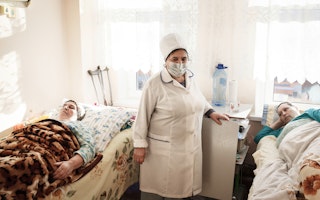License to Deceive? A Big Drug Company’s Smokescreen on Hepatitis C
By Azzi Momenghalibaf
When a big pharmaceutical company announces that it’s giving away licenses to make cheap versions of its medicine, it’s either stepping up to its public responsibility or putting up smoke and mirrors to hide something else. The latest announcement from Gilead Sciences looks like the second kind of case.
On September 15, at a press conference in Delhi’s gilded Taj Palace Hotel, Gilead, a California-based pharmaceutical giant, announced that it would issue a license enabling seven Indian companies to make cheaper versions of its new hepatitis C drug, sofosbuvir, to sell in 91 designated countries. Much of the resulting press coverage described the license as a way to increase access to this life-saving drug, which markets as Sovaldi.
The announcement actually unveiled Gilead’s strategy to control the market by locking out generic competition in key lucrative countries with the highest rates of hepatitis C. Over half of the 91 countries included in the license are among the poorest countries in the world, where most people can’t even afford malaria pills at $1 per treatment.
The countries left out of the license are mostly middle-income nations, home to the vast majority of people living with hepatitis C, and where most people pay for medicines out-of-pocket. These countries—like Ukraine, Thailand, China, Argentina, Georgia, and Brazil that, together, are home to 37 million hepatitis C patients—have systems to diagnose and treat a large number of patients, and governments that want to expand access to treatment.
But making that aspiration a reality is contingent on medicines being affordable. These countries are also considered profitable “emerging” markets by Gilead and other pharmaceutical companies. By excluding them from the license, Gilead has decided that they will have to continue to pay its high prices, wait for generics to enter the market—a process that could take decades—or try to negotiate a low price.
Given these facts, why is Gilead proclaiming this to be an “access” strategy?
One reason may be that it’s answering public pressure. Gilead is right about one thing: cheaper versions of this drug are needed. In the United States, sofosbuvir is priced at $1,000 a pill, making it one of the most expensive and most profitable drugs in the world. But another reason may be more straightforward.
According to researchers, it costs approximately $100 to make sofosbuvir. In the first six months after the drug hit the market, Gilead made nearly $6 billion on sofosbuvir. With margins like those, a drug company might focus on keeping a market to itself, and Gilead seems to be doing just that. Its drug can be sold at exorbitant prices in relatively wealthy countries, while poorer, less attractive markets are open to Indian companies.
Gilead’s announcement primarily distracts from the fact that it is in complete control of the high price it sets. Rather than lowering the price of sofosbuvir everywhere, this license will allow Gilead to continue making record-breaking profits on a drug that has been priced out of reach of the majority of people who need it.
Patients, meanwhile, are suffering. Even in the United States, private insurers and government programs, unable to pay the high price of treatment, are rationing sofosbuvir. The same is true in the UK, where prohibitively high prices mean that only select patients will get it. In Australia, the Pharmacy Benefits Program, akin to Medicaid, cannot afford to offer the drug to patients. How does Gilead propose to address these gaps?
By unnecessarily pricing its hepatitis C drugs out of reach, Gilead has manufactured a reality where 73 million people living with hepatitis C around the world remain excluded from the license. These people have to pay high prices or go without the drug. We are all for consumers in poor countries gaining quicker access to treatment, but this raises a different question.
Instead of doing the most sensible thing to increase access—significantly lowering its price everywhere, as well as allowing generics to come onto the market—Gilead is placing the responsibility onto Indian producers, who are now expected to provide the drugs at a more reasonable price. But why do we expect this of them, and not also of Gilead?
Until November 2021, Azzi Momenghalibaf was a senior program officer with the Open Society Public Health Program.


